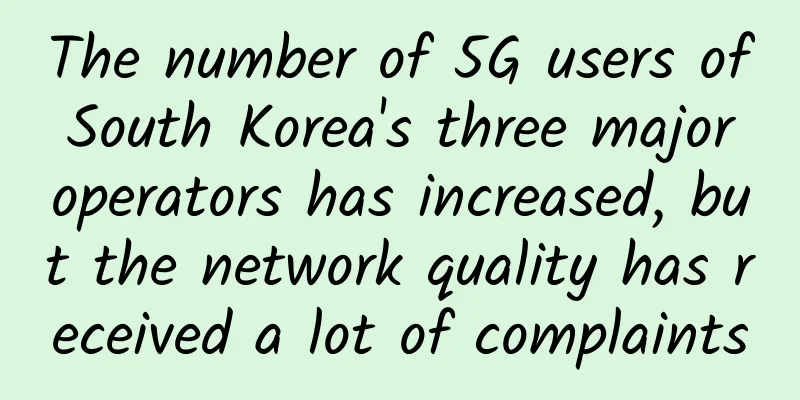The number of 5G users of South Korea's three major operators has increased, but the network quality has received a lot of complaints

|
According to data released by market tracker FnGuide on Monday, the total operating profit of South Korea's three major mobile operators in the fourth quarter is expected to achieve a double-digit increase to 813.5 billion won (about 4.34 billion yuan), of which SK Telecom is expected to be 342.6 billion won, KT is expected to be 253.6 billion won, and LG U+ is expected to be 217.3 billion won. Experts said the profit increase was mainly due to the growth in the number of 5G service users. According to data provided by the Ministry of Science and ICT, the number of 5G users of South Korea's three major mobile operators was 201.8 million as of November last year. Data shows that 27.8% of mobile service users in South Korea currently use 5G networks. Lee Seung-woong, an analyst at eBest Investment Securities, said: "As 5G users continue to increase, mobile operators' profits are expected to increase. In addition, the three companies have saved expenses by avoiding excessive marketing competition." Despite the strong user numbers, there are increasing complaints from users about the quality of 5G services. Due to insufficient 5G network coverage, many users often have to switch from 5G to 4G signals during use. According to a recent survey of 1,000 5G users by the local non-governmental organization Consumer Voice, Korean consumers received an average of 60.9G of 5G data packages from mobile operators, but the actual data usage was 31.1G. The survey showed that users did not use up 100% of their data packages due to insufficient 5G network coverage and lack of interesting content. The main reason for 5G network quality issues is the insufficient deployment of base stations. Due to the frequency used by 5G networks, it is difficult for radio waves to bypass obstacles, which requires mobile operators to deploy more base stations to provide high-quality 5G services. In addition, South Korea's three major mobile operators have slowed down their investment in network infrastructure construction. As of the third quarter of 2021, the three companies' total network infrastructure investment was 4.5 trillion won, down 9.9% from the same period in 2020. Regarding the quality of 5G networks, South Korean ICT Minister Lim Hye-sook has met with the CEOs of three companies and asked them to "expand network facility investment and improve 5G network quality." The CEOs of these companies responded that they would maintain a similar level of infrastructure investment as in 2020. |
>>: HTTPS - Why TLS 1.3 provides better performance and security?
Recommend
A 10,000-word article interprets the operators' fight for 5G: a battle of three kingdoms in financial strength
For a long time, the development of high-tech com...
10 questions to ask during TCP protocol interview
First show the mind map of this article TCP, as a...
How 5G Promotes Smart City Development
Global examples of how smart cities are leveragin...
RAKsmart: Japan/Korea servers start from $59/month, US servers start from $30/month, high-defense servers start from $79/month
Friends who need independent servers in Asia such...
Yan Wangjia, a member of the National Committee of the Chinese People's Political Consultative Conference, submitted five proposals to the two sessions, calling for strengthening information security supervision
[51CTO.com original article] On March 3, the firs...
Is your home connected to the Gigabit Internet? There are nearly 15 million Gigabit broadband users in China
[[417031]] According to Zhongguancun Online, the ...
The new role of IT departments in data center operations and management under the background of green energy conservation
Traditionally, the operation and management of da...
Visit the exhibition area without leaving home and experience Huawei's 5G technology beyond your imagination
[51CTO.com original article] Not long ago, Huawei...
Shocked! Is it possible to disguise yourself on the Internet?
The question of “a lot of money” Boss Wang runs a...
Why are there fewer and fewer open source projects using the GPL protocol?
[Original article from 51CTO.com] Recently, some ...
What traditional financial services can learn from emerging banks and fintech companies
The pandemic has exposed gaps in nearly every ind...
[6.18] Megalayer: Hong Kong CN2 independent server from 400 yuan/month, US cluster server from 888 yuan/month
Megalayer's 618 promotion officially started ...
3 minutes to let you practice the "great movement" of the seven-layer network model
We know that the direct connection between two co...
Server-Speaks-First is a bit of a bummer, protocol detection and opaque ports in Linkerd 2.10
[[416375]] This article is reprinted from the WeC...
5G and eSIM are now a must for IoT companies
Embedded Subscriber Identity Module (eSIM) techno...









